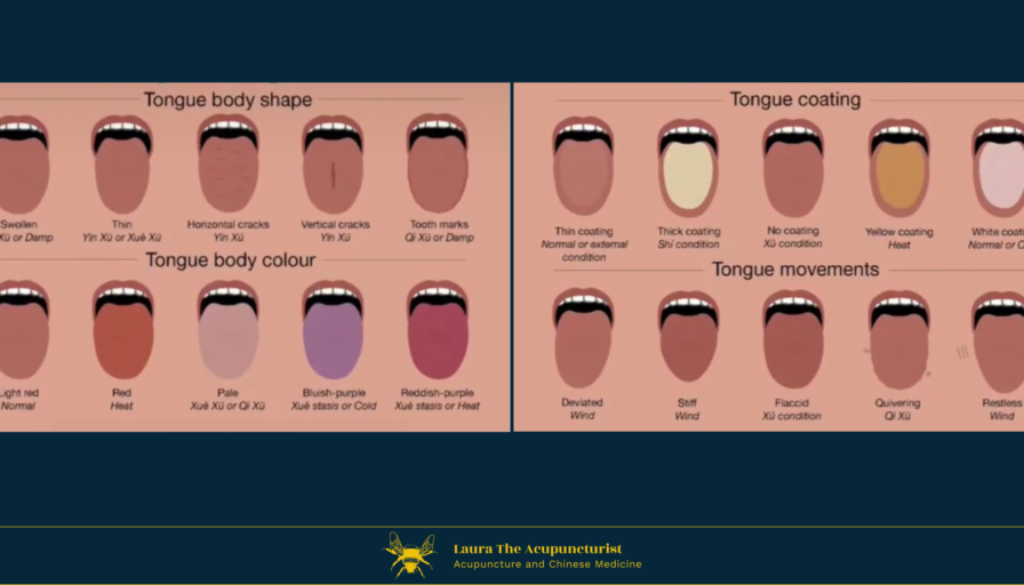Use TCM Tongue Diagnosis To Understand Your Health
Unlocking Health Secrets Through TCM Tongue Diagnosis
I remember as a child, a visit to the GP used to involve having your tongue checked, unfortunately the majority of GPs no longer have time for looking deeper at your health. Even modern AI is now using this ancient tradition.
In Traditional Chinese Medicine (TCM), there is a unique diagnostic method that allows practitioners to gain insight into the body’s internal state without any invasive procedures: tongue diagnosis. The tongue is the only internal muscle that we can see, and it acts as a mirror of what’s happening inside the body. Observing the tongue’s characteristics—its colour, shape, coating, and movement—helps practitioners determine the overall balance and health of the organs, known in TCM as the ZangFu. Let’s explore how this fascinating technique works and what it can reveal about our health.
Mapping the Tongue: Understanding ZangFu Representations
In TCM, the tongue is divided into different areas that correspond to various internal organs, known as the ZangFu. By observing these areas, practitioners can identify imbalances in specific organs.
-
Tip of the Tongue: The tip of the tongue represents the Heart and Lung. A red or swollen tip may indicate emotional stress, anxiety, or imbalances related to the Heart, while a pale tip can point to weakness or deficiency in the Lungs.
-
Middle of the Tongue: The middle section represents the Spleen and Stomach, key organs involved in digestion and metabolism. Issues like digestive problems, bloating, or acid reflux may manifest in this area as swelling, cracks, or changes in coating.
-
Sides of the Tongue: The sides of the tongue correspond to the Liver and Gallbladder. A red or scalloped edge can indicate Liver Qi Stagnation, often linked to stress, irritability, or hormonal imbalances.
-
Root of the Tongue: The back of the tongue represents the Kidneys and Bladder. A thick coating or discolouration in this area may indicate issues related to the Kidneys, such as fluid retention, lower back pain, or reproductive concerns.
Tongue Shape and Its Indications
The shape of the tongue provides valuable information about the state of the body’s Qi (energy), Blood, and organ health.
-
Thin Tongue: A thin tongue often indicates a Blood Deficiency, which can be accompanied by symptoms such as fatigue, pale complexion, dizziness, and dry skin.
-
Swollen Tongue: A swollen tongue with teeth marks along the sides (often called “scalloped edges”) suggests Spleen Qi Deficiency. This condition can lead to digestive problems, sluggishness, and water retention.
-
Cracked Tongue: Cracks on the tongue can indicate Yin Deficiency, often affecting the Kidneys or Stomach. Yin Deficiency can manifest as night sweats, hot flushes, and dry skin.
-
Short Tongue: A tongue that appears shrunken or shorter than usual may point to severe Qi or Blood Deficiency, and it could indicate that the body is struggling to nourish and replenish itself properly.
Tongue Colour: Revealing the Internal Landscape
The colour of the tongue can reveal a lot about the body’s overall condition.
-
Pale Tongue: A pale tongue often indicates Blood or Qi Deficiency. Individuals with a pale tongue may feel fatigued, weak, or experience cold hands and feet.
-
Red Tongue: A red tongue indicates Heat, which may stem from excess conditions such as inflammation, emotional stress, or hormonal imbalances. For example, a red tip is often linked to emotional disturbances affecting the Heart.
-
Purple Tongue: A purple tongue points to Blood Stasis, where blood is not circulating smoothly. This could be linked to pain, poor circulation, or conditions such as endometriosis or fibroids.
Tongue Coating: A Reflection of Digestive Health
The coating on the tongue is another important aspect of TCM diagnosis, as it reflects the condition of the digestive system and overall fluid metabolism.
-
Thick Coating: A thick tongue coating often indicates Dampness or Phlegm in the body, which can affect digestion and energy levels. It can also point to internal pathogenic factors that need to be resolved.
-
Thin Coating: A thin coating is considered normal, but if it becomes too thin or absent, it may indicate Yin Deficiency or Stomach Fluid Deficiency, resulting in symptoms like dry mouth, thirst, and overheating.
-
Yellow Coating: A yellow coating signals Heat in the body, typically in the digestive system. It may be associated with symptoms like constipation, irritability, or skin issues.
-
White Coating: A white coating can indicate Cold or Dampness in the body, often linked to digestive complaints, sluggishness, or respiratory issues.
Tongue Movement: The Qi Flow Indicator
The way the tongue moves can also give insights into the body’s Qi and overall balance.
-
Trembling Tongue: A trembling tongue often signifies Qi or Blood Deficiency. This may be linked to anxiety, fatigue, or even neurological imbalances.
-
Stiff Tongue: A stiff tongue may indicate Liver Qi Stagnation or Wind in the body, which can result in symptoms such as headaches, dizziness, or difficulty moving smoothly.
-
Deviated Tongue: A tongue that deviates to one side may indicate Wind or Qi Stagnation, which could be a sign of neurological issues or previous strokes.
Some Common Patterns in TCM Tongue Diagnosis
-
Liver Qi Stagnation: A tongue with red sides, scalloped edges, and possibly a thick white or yellow coating. This pattern is often seen in people experiencing stress, emotional imbalance, or PMS. Symptoms may include irritability, bloating, and headaches.
-
Spleen Qi Deficiency: A pale, swollen tongue with teeth marks and a thin white coating. People with this pattern often experience digestive issues like bloating, poor appetite, and fatigue.
-
Kidney Yin Deficiency: A red, thin tongue with little to no coating and possible cracks. Individuals may experience symptoms like hot flashes, night sweats, and dry mouth, commonly associated with menopause or chronic stress.
Final Thoughts
The tongue is a window into the body’s internal environment, offering vital clues about organ health, energy flow, and the presence of imbalances. TCM practitioners use tongue diagnosis as a foundational tool to understand the root cause of health issues, providing a roadmap for treatment that often includes acupuncture, herbal medicine, and lifestyle adjustments.
If you’re curious about what your tongue says about your health or are experiencing symptoms that you can’t quite understand, schedule a consultation. A TCM practitioner can help you decode the messages your body is sending through your tongue—guiding you towards a more balanced and harmonious state of health.




